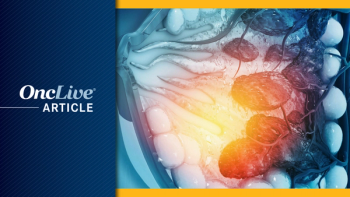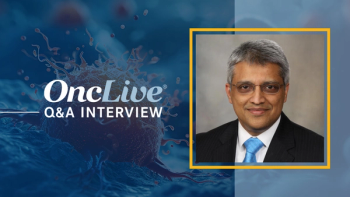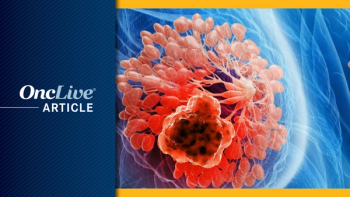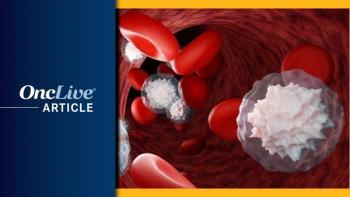
FDA Grants Fast Track Designation to IK-175 in Combination With Nivolumab in Urothelial Carcinoma
The FDA has granted a fast track designation to the novel aryl hydrocarbon receptor antagonist IK-175 in combination with nivolumab for the treatment of patients with advanced urothelial carcinoma who have progressed on or within 3 months of receiving the last dose of checkpoint inhibitors.
The FDA has granted a fast track designation to the novel aryl hydrocarbon receptor (AHR) antagonist IK-175 in combination with nivolumab (Opdivo) for the treatment of patients with advanced urothelial carcinoma who have progressed on or within 3 months of receiving the last dose of checkpoint inhibitors.1
IK-175 is designed to targeted AHR, which is a cancer-driving transcription factor that prevents immune recognition in a multitude of cancers by modulation of innate and adaptive immunity.
“There is an urgent need for new treatment options for [patients with] urothelial carcinoma, many of whom find themselves out of options after progressing on checkpoint inhibitors. The fast track designation for IK-175 reflects the FDA’s interest in the potential role of our AHR antagonist to overcome the development of resistance to checkpoint inhibitors and supports our strategy of combining IK-175 with nivolumab to expand the number of [patients with] cancer that can benefit from immunotherapy,” Sergio Santillana, MD, chief medical officer of Ikena Oncology, stated in a news release.
IK-175 is currently under evaluation as monotherapy and in combination with nivolumab in the phase 1 IK-175-001 trial (NCT04200963) in patients with locally advanced or metastatic solid tumors including urothelial carcinoma.
Initial clinical data from the trial presented at the 2022 SITC Annual Meeting showed that IK-175 was well tolerated and demonstrated encouraging, durable antitumor activity in stage 1 of the trial’s monotherapy and combination arms in patients with urothelial carcinoma.2
In the dose-escalation portion of the trial, 15 patients with advanced solid tumors were treated with IK-175 monotherapy, and 5 patients received the combination of IK-175 and nivolumab. Three patients in the monotherapy arm and 2 in the combination arm experienced prolonged stable disease between 16 and 74 weeks.
In the dose-expansion portion of the trial, 10 patients with urothelial carcinoma received IK-175 monotherapy, and 10 were given the combination. The overall response rate (ORR) in the monotherapy and combination groups were 10% and 20%, respectively, with all 3 responders achieving a partial response. The duration of response (DOR) for these 3 patients ranged from 4.5 to 14.9 months. Additionally, 10% and 20% of patients in the monotherapy and combination groups, respectively, had stable disease, and 60% of patients in each group had progressive disease.
The ongoing study is enrolling patients with locally advanced or metastatic tumors for the dose-escalation phase and patients with unresectable locally recurrent or metastatic urothelial carcinoma for the dose-expansion phase, who have exhausted prior standard-of-care therapies. The expansion cohorts include patients with high levels of AHR by immunohistochemistry.
In the dose-escalation phase, patients are being treated with IK-175 at 200 mg to 1200 mg once per day and 800 mg twice per day in the monotherapy arm, or 800 mg and 1200 mg once per day plus 480 mg of nivolumab every 4 weeks in the combination arm. For the expansion cohorts, the selected dose for IK-175 is 1200 mg once per day.
Safety, tolerability, establishing the maximum tolerated dose, and finding the recommended phase 2 dose are the primary end points. Secondary end points include pharmacokinetics, ORR, progression-free survival, DOR, disease control rate, duration of therapy, and immune pharmacodynamics. Additional pharmacokinetic and AHR target gene changes are exploratory end points.
Regarding safety, no dose-limiting toxicities were observed in either arm, and the MTD was not reached. In the combination arm, 2 serious treatment-related adverse effects (AEs) of grade 3 generalized weakness and grade 3 immune-mediated arthritis were reported.
All patients (n = 43) in both arms experienced at least 1 any-grade treatment-emergent AE (TEAE). Grade 3 or higher TEAEs were reported in 53.8% of patients in the monotherapy arm (n = 26) and 64.7% of patients in the combination arm (n = 17). Any-grade treatment-related TEAEs occurred in 42.3% and 88.2% of patients in the monotherapy and combination arms, respectively. The rates of grade 3 or higher treatment-related TEAEs were 11.5% and 23.5%, respectively. Any-grade serious AEs were observed in 38.4% of patients in the monotherapy group and 52.9% of patients in the combination group.
TEAEs leading to dose modification, drug interruption, or drug discontinuation occurred in 19.2%, 7.7%, and 11.5% of patients in the monotherapy arm, respectively. Those rates were 11.8%, 5.9%, and 5.9% in the combination arm, respectively.
Suspected immune-related AEs included maculopapular rash (11.5% and 11.8% in the monotherapy and combination arms, respectively), proteinuria (3.8% and 5.9%), generalized weakness (0% and 11.8%), immune-mediated arthritis (0% and 5.9%), and adrenal insufficiency (3.8% and 0%).
References
- Ikena Oncology receives FDA fast track designation for novel AHR antagonist IK-175 in combination with immune checkpoint inhibitors to treat urothelial carcinoma. News release. Ikena Oncology. March 6, 2023. Accessed March 8, 2023.
https://ir.ikenaoncology.com/news-releases/ - Aggen DH, McKean M, Lakhani NJ, et al. Initial results from a phase 1a/b study of IK-175, an oral AHR inhibitor, as single agent and in combination with nivolumab in patients with advanced solid tumors and urothelial cancer. Presented at: 2022 SITC Annual Meeting; November 8-12, 2022; Boston, MA. Abstract 661.

























































































